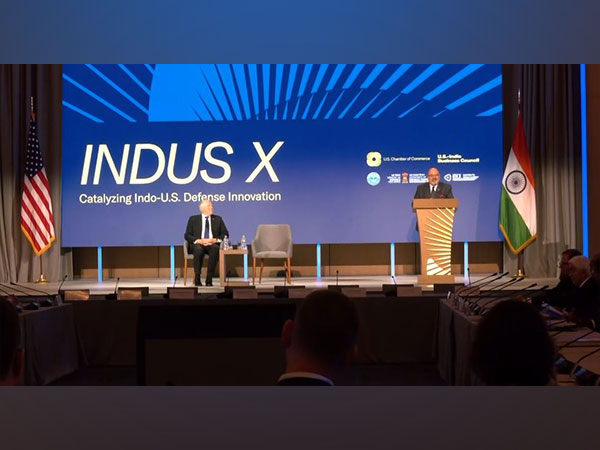Indus-X: Strengthening Indo-US Defense Partnerships Through iCET

- The release said that the countries could bring these suggestions up at current trade talks, such as the India-US Strategic Trade Dialogue, if they thought it was necessary.
- The countries also plan to look into options (such as a public-private partnership) for a fund to help start-ups in high-tech defense, like a public-private alliance.
The defense departments of India and the US started the India-US Defence Acceleration Ecosystem (INDUS-X) on Wednesday. Its goal is to strengthen the strategic technology relationship and defense industrial cooperation between the two countries, according to a press release.
The official statement said, “This initiative builds on a promise made by the US and Indian National Security Advisors to launch a “Innovation Bridge” to connect US and Indian defense start-ups in January 2023 as part of the US-India initiative on Critical and Emerging Technology (iCET).”
According to the press release, the backing of both governments will bring the private sectors closer together and help the research institutions in the defense industrial bases come up with new ideas.
Through INDUS-X, the India-US defense manufacturing ecosystems will be strengthened so that they are more innovative, accessible, and stable.
The US-India Business Council and the US Chamber of Commerce put on the two-day event to get things moving.
Governments, academic and research institutions, investors, defense companies, technology incubators, industry associations, and other groups that help startups got together to come up with bold plans to move INDUS-X forward.
During the event, a number of possible steps were taken to move the collaboration plan forward.
The release said that under the Bilateral Cooperation Mechanism, a Senior Advisor Group (SAG) will evaluate how the collaboration plan is going and make suggestions for future work to the defense establishments and other INDUS-X stakeholders.
The US Institute of Peace (USIP), Carnegie India, the US International Business Council (USIBC), the US-India Strategic Partnership Forum (USISPF), and the Society of Indian Defense Manufacturers (SIDM) will hold follow-up programming to drive implementation of the collaboration agenda and find barriers to implementation for the SAG to consider.
Several initiatives run by industry and academia were also started. Under these initiatives, Indian and US defense companies plan to look for ways to set up formal and informal mentoring relationships with start-ups to help them with market access, business strategy, and technology know-how, according to the release.
Under the Accelerator Program for Defense Startups, the Information Technology Industry Council (ITIC) and the Indian Institute of Technology (IIT) Hyderabad, along with other INDUS-X stakeholders, have said they want to look for ways to help startups with jointly defined problem sets, mentoring, and exposure to defense commercialization, business development, product refinement, technology advancement, funding opportunities, and other areas.
Under the Academic and Start-up Programming Partnerships with Universities and Accelerators, Pennsylvania State University, IIT Madras, and IIT Kanpur have said they want to lead best practice workshops with Indian and American universities and accelerator partners, such as labs, Technology Hub (T-HUB), IITs, and Hacking for India, to share best practices in defense innovation, fielding, and commercialization, the release said.
Aside from this, several partnerships between start-ups and the supply chains of defense majors were also talked about. Under these agreements, Indian and US defense companies may look into ways to work with start-ups on their supply chains.
During the INDUS-X event, there were also talks about several Public-Private Partnerships. Under this, both countries, along with outside partners, will look into joint challenges for U.S. and Indian start-ups that use dual-use cases that are common to both countries.
Both countries also want to look into ways for new businesses to get access to each other’s research and development (R&D) centers and innovation labs. This will help new businesses work together.
“INDUS-X stakeholders also want to find ways to improve testing and certification in India and the U.S.,” the press release said.
IndiaSpora, IndUS Tech Council, Forge/Coimbatore, and T-Hub/Hyderabad will talk to private investors to get their backing for investing in defense and dual-use startups. The countries also plan to look into options (such as a public-private partnership) for a fund to help start-ups in high-tech defense, like a public-private alliance.
The Senior Advisor Group will also suggest changes to each country’s regulatory schemes (such as DFARS, ITAR, EAR, and Make in India) to make it easier for start-ups in both countries to come up with new ideas and to increase chances to buy things from each other. The release said that the countries could bring these suggestions up at current trade talks, such as the India-US Strategic Trade Dialogue, if they thought it was necessary.
Both countries want to look into ways to standardize approval for technologies that were made by their defense innovation ecosystems, which would make them easier to use. Focus areas include Quality Assurance (QA) parameters, certification standards, and notes on program success.







Facebook Comments